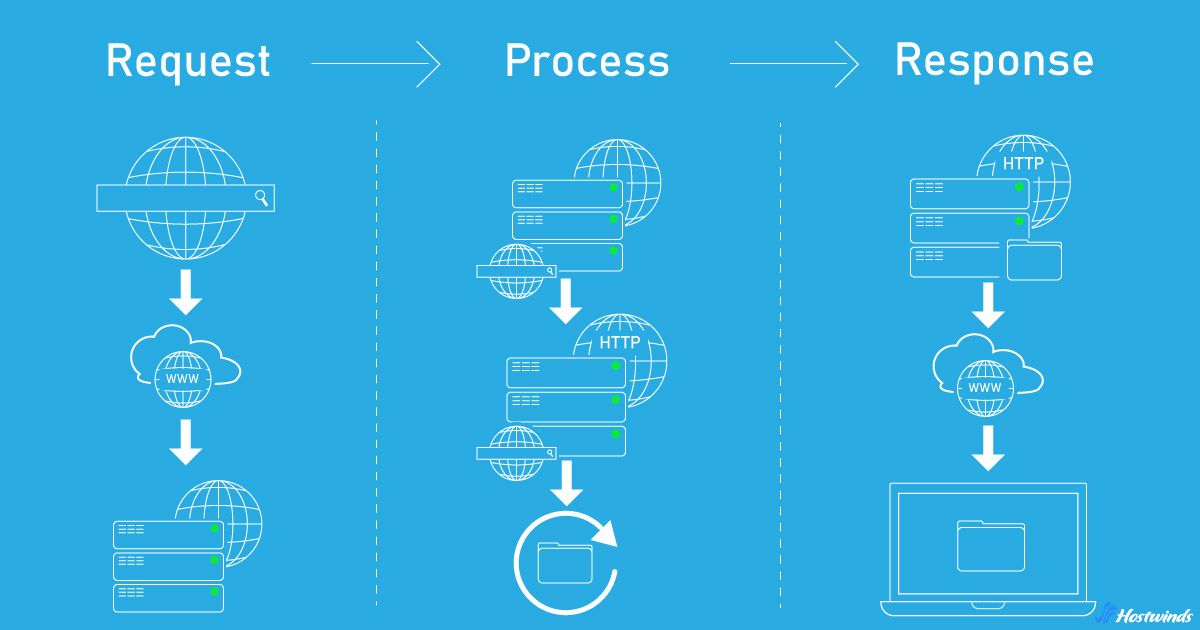Hostwinds Blog
Search results for:

Web Servers: What are they and How do they Work?
by: Hostwinds Team / December 26, 2023
What Are Web Servers?
Web servers are computer systems that host and deliver website content over the internet via web browsers.
Every web server is comprised of two main components:
Hardware: The web server hardware is the physical computer - CPU, RAM and SSDs or hard drives - that stores web server software and website files (HTML, CSS, Javascript, images, fonts etc.). It also connects to the internet, exchanging data with other physical devices connected to the web.
Software: A web server's software consists of several elements dictating how users access hosted files, the core element being an HTTP server - a software used to process and respond to browser requests.
How do Web Servers Work?
In order for a browser to render content for the user, it has to go through a series of steps, which can be broken down into three phases: Request, Process and Response.
Request Phase
When a user types in a URL (ex. hostwinds.com/blog) and hits enter, the browser sets out to find the web server associated with the domain name (ex. www.hostwinds.com).
For this to happen the browser needs the domain's IP address, which involves passing the domain name through the DNS (Domain Name System).
Once the IP address is identified, the browser connects to the web server via HTTP request.
Process Phase
The web server receives the HTTP request through its HTTP server.
The HTTP server processes and accepts the request then searches the web server database for the appropriate resource (i.e. hostwinds.com/blog).
Response Phase
Once found, the HTTP server packages the requested resource into an HTTP response and deliver's the resource to the browser.
The browser receives the HTTP response and renders it for the user.
Alternatively, if the HTTP server is unable to find the resource matching the HTTP request, it will return an error message to the browser, usually in the form of 404 Not Found.

HTTP Communication
HTTP (Hypertext Transfer Protocol) is a protocol, or set of rules, that specifies how hypertext (web document) is transferred between two computers. It is the foundation of data exchange between a browser and web server.
HTTP utilizes a textual, stateless protocol, which means all commands are plain-text and human-readable, and neither the server nor browser store previous communications. In other words, the web server cannot recall login information or transactions with HTTP alone - an application server is required for such capabilities (we'll touch on this in the next section).
Static and Dynamic Web Servers
Depending on the needs and desired functionality of a website, web servers can populate content statically or dynamically.
Static Web Servers are made up of a computer (hardware) and HTTP server (software).
They deliver files to the browser exactly as they were stored on the web server. The content remains the same for every user regardless of outside influences like geolocation or user interaction.
Since there's no need for real-time processing, static servers are often faster and more straightforward, making them a preferred choice for informational or read-only content like blogs or resume sites.
Dynamic Web Servers consist of a static web server (computer and HTTP server) with additional software, usually an application server and a database.
Before sending to the browser, the application server updates hosted files from information stored in the database, such as previous user interactions. For example, ecommerce stores providing product recommendations based on previous purchases.
Why Use Web Servers
For a website to be accessible online, its files need to be hosted on a web server.
While it's technically possible to host these files on a local desktop computer, using a web server through a web hosting provider is a far better idea for a number of reasons.
Availability and Performance: Reputable hosting providers regularly maintain and update web server hardware and software, ensuring fast websites and high uptimes.
Security: Web hosts provide high level security protocols, from firewalls to DDoS protection, that safeguard websites from cyber threats.
Cost-effective: Web servers are expensive to own and operate. Hosting companies make it possible for any budget to develop and launch a website using the latest web server technology
Scalability: As websites grow so do their resources and web hosts like Hostwinds provide instantly scaleable plans.
Dedicated IP: Many ISPs (internet service providers) don't provide fixed IP addresses for personal use. Hosting providers offer dedicated IPs, mitigating potential performance or security issues.
Web Server Configuration
Web server configuration plays a significant role toward performance of web content delivery and data security. Hosting providers typically have these fine-tuned to specific hosting plans but can also take a bespoke approach based on customer requirements. Regardless of plan, there are several universal elements a great web host will focus on:
Security Measures: Hosting companies take all precautions to ensure data is secure and cyber threats are mitigated. This includes data encryption through Secure Sockets Layer (SSL) or Transport Layer Security (TLS), along with firewalls, DDoS countermeasures, and antivirus software.
Performance Optimization: Optimizing resource distribution through CDNs
Implementing caching mechanisms to store frequently accessed data, helps reduce the need for repeated processing and speeds up the delivery of web pages.
Scalability Considerations: Web hosts anticipate growth and plan for scalability with solutions that allow easy resource upgrades, and offer load balancing to distribute incoming traffic across multiple servers.
Backups and Redundancy: Automated backup systems and 2N redundancy ensure that even in the event of data loss or a server failure, site files can be recovered and downtime is minimized .
Monitoring and Analytics: Many hosting services provide server monitoring to track performance, detect anomalies, and address issues. Hostwinds offers real-time monitoring, allowing us to proactively monitor server performance and open support tickets automatically in the event of an issue.
Conclusion
Web servers are the foundation upon which the internet thrives by providing the infrastructure for our digital experiences. Whether you're a beginner exploring web hosting or a seasoned developer, recognizing the pivotal role of web servers is the first step towards crafting a successful online journey.
Remember, the world of web servers is dynamic and ever-evolving. Stay curious, keep learning, and enjoy the exciting journey. If you have any questions or want to explore more advanced topics, the Hostwinds community is here to support you.
Happy hosting!
Written by Hostwinds Team / December 26, 2023
